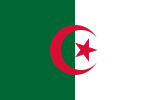Music of Algeria
| Part of a series on the |
| Culture of Algeria |
|---|
 |
| People |
| Mythology |
| Art |
Algerian music is virtually synonymous with raï among foreigners; the musical genre has achieved great popularity in France, Spain and other parts of Europe. For several centuries, Algerian music was dominated by styles inherited from Al-Andalus, eventually forming a unique North African twist on these poetic forms. Algerian music came to include suites called nuubaat (singular nuuba). Later derivatives include rabaab and hawzii.
Genres
Music in Algeria offers a rich diversity of genre: popular music (Shaabi), Arabo-Andalusian music (Malouf San'aa, Gharnati, etc.), classical Arabic, Bedouin, Berber music (Kabyle, Shawi, Tuareg, etc.), Rai etc.
Sha-bii is, in North African countries, folk music; in Algeria, however, it refers to a style of recent urban popular music, of which the best known performer was El Hajj Muhammad El Anka, considered to be the Grand Master of Andalusian classical music. True styles of folk music include hofii, a form of female vocal music, and zindalii, from Constantine.
Rai is a creative outlet to express political discontent. This music is a mix between Western music and Bedouin music.
The Malouf is the Arab-Andalusian music of Constantine and is also well known in Tunisia and Libya, it is a very large number of diversified musical repertoire of Algeria. Nevertheless, malouf can not compete commercially with popular music, much of it Egyptian, and it has only survived because of the efforts of the Tunisian government and a number of private individuals. Malouf is still performed in public, especially at weddings and circumcision ceremonies, though recordings are relatively rare.

Important musicians
- Cheikh Larbi Ben Sari, composer and musician from the Tlemcen school of Andalusian music
- Abdelkrim Dali, Master of Hawzi classical music
- El Hadj Mohamed El Anka, Master of Chaabi classical music
- Cheikh Mohamed El Ghafour, musician from the Tlemcen school of Hawzi music
- Mohamed Tahar Fergani, musician and master of the Malouf classical style
- El Hachemi Guerouabi, musician and reformer of the Chaabi classical style
- Fadela Dziria, singer of Hawzi classical style music
- Kamel Messaoudi, singer of Chaabi music
- Warda Al-Jazairia, singer of classical Arab oriental music
- Dahmane El Harrachi, a singer composer and songwriter of Chaabi music
- Zaho, an Algerian R&B singer based in Canada.
- Souad Massi singer, songwriter and guitarist now living in France
- Karim Abranis singer, songwriter and guitarist now living in France
- Khaled, king of Raï. Singer, songwriter now living in France.
- Rachid Taha, based in France. His music mixes rock, punk and techno with traditional Arabic instruments.
See also
References
Bibliography
- Morgan, Andy. "Music Under Fire". 2000. In Broughton, Simon and Ellingham, Mark with McConnachie, James and Duane, Orla (Ed.), World Music, Vol. 1: Africa, Europe and the Middle East, pp 413–424. Rough Guides Ltd, Penguin Books. ISBN 1-85828-636-0
- Morgan, Andy. "Bards of Immigritude". 2000. In Broughton, Simon and Ellingham, Mark with McConnachie, James and Duane, Orla (Ed.), World Music, Vol. 1: Africa, Europe and the Middle East, pp 425–427. Rough Guides Ltd, Penguin Books. ISBN 1-85828-636-0
- La Chanson de l'exil ; les voix natales (1939–1969), Rachid Mokhtari, Alger, Casbah Éditions, 2001
- Chants kabyles de la guerre d'indépendance, Mehenna Mahfoufi, Éditions Séguier, 2002.
- Les grands maîtres algériens du cha’bi et du hawzi, diwan arabe-kabyle, textes transcrits, traduits et annotés sous la direction de Rachid Aous, Éditions El Ouns/Unesco, Paris, 1996.
- Bezza Mazouzi La musique algérienne et la question raï, Richard-Masse, Paris, 1990.
External links
- BBC Radio 3 Audio (90 minutes): Rai music in Oran and the Kasbah of Algiers. Accessed November 25, 2010.
- BBC Radio 3 Audio (90 minutes): Rachid Taha and the Kabilian mountains.. Accessed November 25, 2010.
- Audio clips - music of Algeria. French National Library. Accessed November 25, 2010.
- Template:FrAudio clip: traditional Algerian music. Musée d'ethnographie de Genève. Accessed November 25, 2010.
